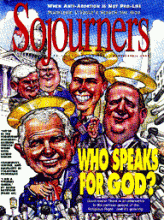George Bernard Shaw once said, "God created us in his own image; and we decided to return the favor." The truth of that statement certainly has been born out in recent days. Many politically conservative evangelical Christians have been not too subtly transforming God into a transcendental member of the right wing of the Republican Party. It is not just a matter of their making a biblical case for their political agenda; they seem to be going further than that. They are giving the impression that anyone who disagrees with their agenda is outside the will of God. These people have been so effective in associating evangelical Christianity with right-wing Republicanism that to the secular press the word "evangelical" has come to mean the Christian Coalition.
This recent development has generated great consternation among many of us who, over the last few decades, have used the word "evangelical" to establish our own religious identity. We now have to ask, Can we continue to use that title? We hold to the orthodox theology of evangelicalism, but we are not about to buy into all the values and programs espoused by the Religious Right. We have questions to raise about how much care for the poor, how much justice for the oppressed, how much responsibility for the natural environment, and how much concern for Third World peoples is written into their program for society.
Those of us who used to be able to call ourselves "evangelicals" have been a people theologically akin to fundamentalists. We have believed in the deity of Christ, salvation through his death and resurrection, and in the infallibility of scripture. Where we differed from fundamentalists was that we embraced a host of social concerns that they, in reaction to the "social gospel" of liberal Protestantism, were going to avoid. We also rejected the anti-intellectualism, legalism, and separatist tendencies of fundamentalism. We evangelicals were ready to dialogue with
Read the Full Article

